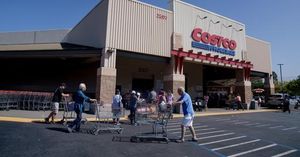As of April 4, 2025, Amazon (AMZN) stock is facing significant challenges, as a combination of external economic pressures and internal forecasts paint a mixed picture for the e-commerce giant. The stock has been in a downward spiral, with analysts expressing caution over its future revenue growth amidst a backdrop of tariffs and shifting consumer sentiment.
According to John Blackledge, a five-star analyst from TD Cowen, Amazon's stock has continued to plunge, prompting him to lower his price estimate from $265 to $240. Despite this adjustment, Blackledge maintains a "Buy" rating on the stock, citing its robust infrastructure and substantial Prime member base as key strengths. He predicts an 8.2% year-on-year revenue growth, estimating Amazon will generate $155.1 billion in the first quarter, driven largely by its Amazon Web Services (AWS), advertising, and subscription services.
However, Blackledge has tempered his expectations for revenue and operating income for the remainder of 2025 and the years beyond, attributing this to the tariffs recently imposed by President Trump and a general softening of consumer sentiment. He notes that these tariffs could negatively impact Amazon's international segment and contribute to a less favorable consumer outlook.
In a broader context, the uncertainty in the stock market is prompting many investors to reassess their portfolios. With President Trump's ongoing tariff actions against trade partners and economists warning of a potential recession, investors are taking a more cautious approach. This has led to a closer examination of leading consumer goods companies like Amazon and Home Depot (HD), which have been compared as potential stock buys during this tumultuous time.
Home Depot recently reported a solid fourth-quarter performance, with sales reaching $39.7 billion, surpassing Wall Street's expectations. However, the retailer's outlook for 2025 is less optimistic, with management projecting only a 2.8% increase in sales and a 2% decline in adjusted earnings per share compared to the previous year. High mortgage interest rates and inflation are contributing to a challenging environment for Home Depot, which could impact consumer spending on home improvement.
In contrast, Amazon's diverse revenue streams have historically allowed it to thrive during economic downturns. For instance, during the COVID-19 pandemic, Amazon's revenue surged by 22%, and it experienced a 29% increase during the 2008 financial crisis. While there are no guarantees that Amazon will replicate these results in the face of a potential recession, its significant investments in cloud computing and artificial intelligence position it well for future growth.
Amazon Web Services (AWS) currently holds a commanding 30% share of the cloud computing market, outpacing competitors like Microsoft and Alphabet. Goldman Sachs estimates that global cloud sales could reach $2 trillion by 2030, driven largely by advancements in artificial intelligence. Amazon's commitment to AI is evident, having invested $14 billion in AI leader Anthropic, further solidifying its place in the tech landscape.
Despite these strengths, analysts are wary of the potential impact of tariffs and economic uncertainty on Amazon's stock performance. Blackledge notes that while Amazon has a strong position, macroeconomic headwinds could dampen consumer spending and lower advertising demand. Nevertheless, he remains optimistic about Amazon's ability to maintain revenue growth and operational income above expectations, even amid challenging conditions.
Amazon's stock has been a focal point for many investors, with 339 hedge fund portfolios holding its shares at the end of the fourth quarter of 2024, up from 286 in the previous quarter. The company achieved global revenue of $187.8 billion in the fourth quarter of 2024, reflecting an 11% year-over-year growth, excluding the impact of foreign exchange. The strong performance was bolstered by growth in advertising and AI products, leading to an all-time high operating margin of 11%.
As of April 3, 2025, Amazon's stock closed at $178.41 per share, with a market capitalization of $1.891 trillion. However, in the month leading up to this date, the stock had experienced a -10.46% return, and it has lost 3.60% of its value over the past year. This volatility is indicative of the broader uncertainties affecting the market.
In light of these developments, investors are left to ponder whether Amazon remains a viable investment option. While the company's diversified business model and leadership in cloud computing provide a solid foundation, the looming economic pressures could introduce significant risks.
The consensus among analysts suggests a strong buy for Amazon, with a consensus price target of $268.74, implying a potential upside of 50.63%. As the economic landscape continues to shift, investors will need to weigh the risks and rewards of holding Amazon stock against the backdrop of changing market conditions.
In summary, while Amazon faces immediate challenges, its long-term potential remains strong, supported by a diverse portfolio and a leading position in both e-commerce and cloud computing. Investors will need to stay informed and agile as they navigate this complex environment, assessing the implications of tariffs and consumer sentiment on their investment strategies.







